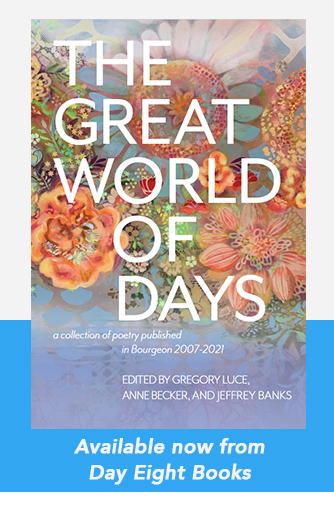Glass Dreams
In dream,
my father witnessed the ceremonial conclusion of my apprentice scholar period—
when my name was summoned into awakening—
accepts my absence from the quorum of gents,
recognizes my alternative Sabbath days,
beams with pride at my harvest,
recites selections from the lyrics, even the bawdy ones,
encourages me to go a courting, to welcome Prince Charming—
with his as yet undefined salt-and-pepper-beard,
now astride a recalcitrant mule,
now walking along a desolate country road,
now bent over a baroque farce winking in fuchsia omniscience—
delights in my flavors,
the ways of me,
my rare bird perched against an aghast sunset on the fire escape ledge.
In dream,
my mother survived
the surge of sugar,
the waves of discord
crashing both upstairs and down,
the scarcity of bloom and caress,
the long-night interlude rigid in the bed of turbulence,
aghast against the adamant prohibitions,
the flight from Sabbath feast
somehow conjured onto wan cloth,
the anguish over the nearly born,
the invasion of tumor,
the varicose veins,
all the lost years,
the heart not shuttered,
but worn down.
In dream,
we are a family on rain-soaked terra firma.
Zevulun wants to know how I resolved a thorny translation matter.
I inquire after his mastery of the sacred slang
blended in the kosher dairy fast-foodery.
Rinah beckons me, not for a candlelit Sabbath,
but for leftover potato kugel
and chocolate peanut butter squares and almond milk,
better that we may banter
without partition, without veil, without ritual,
reunite for intermezzo, however occasional,
put down our walking sticks
to gather bluebells and buttercups and black-eyes Susan’s,
to reminisce with fondness
on (imagined) Augusts by the lake of long ago.
Upon awakening,
I handle the items on this impossible (dirty) laundry list—
these dreams—
with tenderness, however wary; with regard, however prickly.
I place them gingerly in the curio cabinet behind the kitchen table.
There, they sparkle in the fury of the obscure sun of noonday,
gleam in the glow of moon and stars and comets.
And yes, in the blue of constellations, too.
From time to time, in their relentless ingenuity,
in their vinegar resolve,
they escape the locked doors—
all the futile precautions—
and pirouette and skip about my garret quarters.
Somehow, I manage to capture them,
though they have darted from my grip,
and return them to their place of Sabbath unrest.
Siesta’s Sustenance
There’s no narrative arc here. Instead, a framed vertical oval.
All that they taught us in literature class and
which I wrote down in my diligent if ungainly penmanship
in narrow-lined blue books had been imbibed
not in vain, but for another day.
Another hour. Other rooms.
Not the parlor, when tea is served on flower-bordered porcelain
to catch the latest gossip, and when newspapers crinkle in leisure.
Especially the book review section, often featuring Papa’s
judicious, occasionally enthusiastic, offerings.
Although, to locate the arc, we really wouldn’t have to look far.
We could always discuss the marriages, births, marriages, deaths…
stockpiled in Papa’s lair all the way at the end of the hall,
mull the handwriting spidery over the pages somehow salvaged in exile.
We could consider the various certificates, charts, trees, and tomes
that led our family to this place of possibility at this moment in time.
But here, in these “front” rooms, the denouement is missing;
the clash, the conflict, the climax, call it what you will,
if it exists, is utterly invisible.
Happens outside the frame, off the canvas.
No shouts here.
No broken plates. Or broken glass.
All I see are days delicate to discover. The intricacy of clues
that might be understood years later as ebbs and flows.
Mama passes on her culinary “secrets” to the neighborhood girls
whose mothers never mention her wish that I too had been born one.
Mama never teaches me these recipes, despite that wish,
although I eavesdropped from the gossamer of her closet.
And my nose remembers. Tagine. Paella. Shakshouka. Goulash.
The mélange that was Mama’s “Mangia!”
They say the path to a man’s heart is through his stomach.
Only Papa barely registers Mama’s culinary alchemy;
so focused is he on her voice,
on the smoke and sway and swing of her.
The mezuzah wishes he would kiss it with such hunger.
Is Mama cooking for the neighborhood girls?
The breeze ruffles the lace curtains, vertical lines
interrupted by an idea of daisies that failed to interrupt the sun,
as Mama and Papa revel
in their so-called “siesta.”
Omar calls to me.
Without his ever speaking,
without a pebble clinking on my bedroom window,
I know when he is waiting.
The pigeons make sure to deliver the unwritten message.
I descend to snuggle with Omar, to his body elongated,
his nipples breathtaking in the shadows, in the cacophony of secrecy,
to join him in a so-called “siesta” of our own.
Mirage
And I am over the moon with this new sun
that peers warily then evenly in response to September rain
into which the gods had led me following words exchanged
and which emblazoned the meadows with a violet hitherto unseen
I did not expect this light
did not seek it in fact fled from it
craving the forgiveness of shadow and stone wall
across which moss spread and ivy clung threatening to choke
only here now is this frolic across hearth
an embrace of harvest amassed from the inferno of Hades’ dominion
an agility of beam meandering and knitting
so that once gray and brown is now fleetingly sparkle
in this scrounged room this interval pilfered
for lo seven years I must not tarry in the damp and chill
and here by this platform startlingly bejeweled
wrought of centuries’ patience and sudden sweat and thwack
with its roses daubed by Gran’s then-steady hand
and exhortations to humility overhead and columns supple alongside
all that I had asked for which I presumed to be miniscule
is brought forth from mineral is conferred
and those words exchanged though not retracted nor redeemed
are backgrounded
and there is your touch upon the stoop that is my shoulder
not leading me but being with me in this room transformed into chamber
and there can now be no question of the chamber’s aftermath
of diplomacy that may stumble beyond this hearth dance
and I am over the moon with this old sun
And I am suffused in smolder in the foresight of that September rain

Yermiyahu Ahron Taub is a poet, writer, and translator of Yiddish literature. He is the author of two books of fiction and six volumes of poetry, including A Mouse Among Tottering Skyscrapers: Selected Yiddish Poems (2017). His recent translations from the Yiddish include Dineh: An Autobiographical Novel (2022) by Ida Maze and Blessed Hands: Stories (2023) by Frume Halpern. Please visit his website. Taub lives in Washington, D.C.
Image: Aviv Hod, CC BY 3.0 https://creativecommons.org/licenses/by/3.0, via Wikimedia Commons


